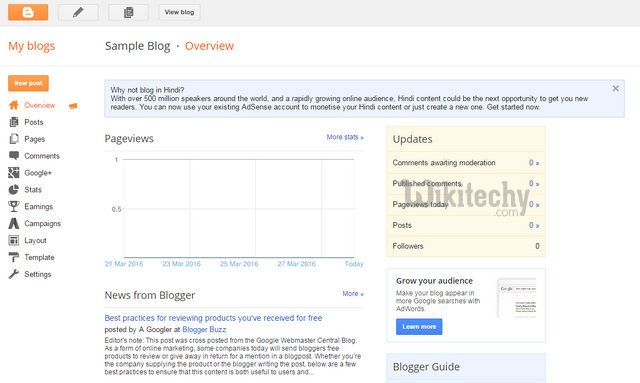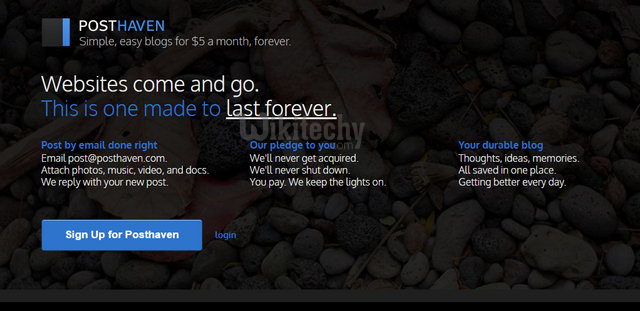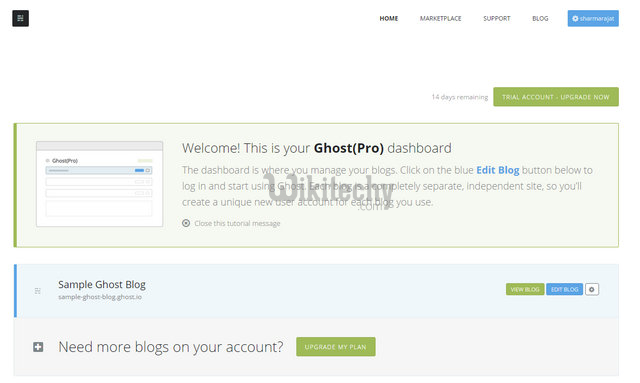From social networking services, to instant messaging apps, to video sharing websites, there are many means by which information can be shared online with others. However, when it arises to interactive thoughts and ideas effectively over the web, there’s hardly a medium that works better, than blogging. Perhaps this is the reason that these days, anyone and everyone, from individuals to big corporations, has a blog.
[ad type=”square”]Out of the many blogging platforms available out there, the Yahoo! possessed Tumblr is perhaps the most unique. Built around a “short-form” blogging method, it lets users post text, pictures, as well as multimedia from an easy to use dashboard. And Tumblr’s popularity can be showed from the fact that it hosts over 280 million blogs (as of March 2016). But as impressive as it is, what if you want something else?
Looks like you’re in luck, as we’ve curated this listing of the best Tumblr alternatives from you. So what’s the hold up? Get reading!
Best Tumblr alternatives
1. WordPress

It’s impossible to talk about blogging platforms without mentioning WordPress. Powering up 25% of all the websites (as of February 2016), it is undoubtedly the most popular Tumblr alternative that you should consider. WordPress comes in two variants, a free and open source script based content management system (CMS) that can be installed on a web server, and a freemium blogging platform that helps you get your first blog started in seconds. WordPress is extremely customizable, thanks to the innumerable themes and functionality enhancing plug-ins available for it. Not just that, it has everything you’d expect from a solid blogging service, including multi-user support, social network integration, SEO, and custom tags/categories. In essence, if you want a fully loaded blogging service, WordPress is an absolute no-brainer.
[ad type=”banner”]It’s difficult to discuss blogging stages without saying WordPress. Powering up 25% of all the websites (as of February 2016), it is without a doubt the most famous Tumblr elective that you ought to consider. WordPress comes in two variations, a free and open source script based substance administration framework (CMS) that can be introduced on a web server, and a freemium blogging stage that helps you kick your first blog off in seconds. WordPress is extremely customizable, because of the innumerable themes and functionality enhancing plug-ins accessible for it. Not only that, it has all that you’d anticipate from a strong blogging administration including multi-user support, social network integration, SEO, and custom tags/categories. Generally, in the event that you need a completely stacked blogging administration, WordPress is a flat out easy decision.
Pros:
- Extremely popular and reliable
- Strong administration features
- Fully scalable, with robust support
Cons:
- Gets fairly complicated (especially if your blog has multiple scripts, custom plugins etc.)
- Web-based post editor not exactly the best
Best suited for:
- Individuals getting started with blogging
- Corporations wanting tailor made product/communication blogs
- Monetization focused blogs
2. Blogger
[ad type=”banner”]
Possessed by the tech monster Google, Blogger is one of the least demanding blogging stages out there. Also, in case you’re put resources into the Google biological community, this is recently the Tumblr elective for you. It incorporates a super simple web-based post editor, and you can have up to 100 web journals for every record. Blogger likewise has options for viewing detailed stats, such as monthly page-views, traffic sources etc. for your blog. Gracious, and there is full mix with Google’s AdSense program too, for simple adaptation. In conclusion, all the general blog components, for example, multi-client bolster (with authorizations), posting by means of email, and remarks are upheld as well. However, even with the majority of that, Blogger isn’t without its drawbacks, most remarkable of which is that it doesn’t let you host your blog on a web-server. So on the off chance that you have your own custom area, you need to utilize DNS usefulness to divert it to the blog.
Pros:
- Backed by Google
- Extremely easy to set up
- AdSense integration for easy monetization
Cons:
- Not scalable
- Restricted customization, with barely any themes
- Limited plugin support
Best suited for:
- Individuals looking for occasional blogging
- People who don’t want to spend on features like hosting, custom templates
3. Soup

It may be oddly named, but Soup almost exactly mirrors Tumblr in both user interface and features, thus making a strong case for a robust Tumblr alternative. From texts to quotes, and from images to videos, it lets you post everything, and then some more. It can directly import posts from a large variety of social networks (e.g. Twitter, Reddit, SoundCloud), and lets you automatically publish posts to Facebook too. Also, you can point your custom domain to your Soup micro-blog easily. There are many Soup groups (based on topics like animals, TV shows etc.) that users can join and post to, thus creating a collaborative stream of posts. In a nutshell, Soup is a simple micro-blogging platform that works. Just don’t expect it to match up to heavyweights like WordPress.
Pros:
- Largely similar to Tumblr in features, helpful for migrating Tumblr users
- Fairly good customization options, along with custom CSS editing
- Auto posting via Email
Cons:
- No custom plugins, ad-supported free tier
- Nothing in way of monetization support
- Looks unpolished
Best suited for:
- Young bloggers looking for simple blogging and re-posting of content
4. Medium

Possessed by the tech monster Google, Blogger is one of the least demanding blogging stages out there. Also, in case you’re put resources into the Google biological community, this is recently the Tumblr elective for you. It incorporates a super straightforward electronic post editorial manager, and you can have up to 100 web journals for every record. Blogger likewise has alternatives for review definite details, for example, month to month online visits, activity sources and so on for your blog. Gracious, and there is full mix with Google’s AdSense program too, for simple adaptation. In conclusion, all the general blog components, for example, multi-client bolster (with authorizations), posting by means of email, and remarks are upheld as well. However, even with the majority of that, Blogger isn’t without its drawbacks, most remarkable of which is that it doesn’t give you a chance to have your blog on a web-server. So on the off chance that you have your own custom area, you need to utilize DNS usefulness to divert it to the blog.
[ad type=”banner”]Pros:
- Curated content, rich in quality
- Private/public posts, scheduling options
- Built-in stats for checking user engagement on posts
Cons:
- Heavily restricted, with almost no customization
- No Google Analytics support
Best suited for:
- Serious authors looking towards writing quality content
- Individuals focused on interaction and networking driven by posts
5. Posthaven

Need a Tumblr option that will stick around for good? Posthaven may very well be what you’re searching for. With a forthright soliciting cost from $5/month for a blog record (each having up to 10 online journals), Posthaven, in its own particular words, is an administration that plans to keep going forever. They additionally have a vow that expresses that the administration will never get sold or obtained, ever. It’s established by the makers of the now-outdated Posterous, and incorporates highlights like secret word ensured web journals, email warnings for blog action, and posts having reports and sound/video . It ought to likewise be noticed that Posthaven is very youthful and still a work in progress. All stated, Posthaven is promising, however the way that it doesn’t offer a trial record, and you can’t begin utilizing it unless month to month charge is paid, is a killjoy.
Pros:
- Minimal, with a balanced set of features
- Near guaranteed to keep running
- Future goals include permanent post links, even after users stop paying
Cons:
- Sparse information on website
- No trial accounts, nothing about monetization
Best suited for:
- People who want a simple and reliable service, and don’t mind paying for it
- Users wanting to support an upcoming platform
6. Ghost

The result of a successful Kickstarter funding campaign, Ghost is an open source blogging platform that’s planned to make writing and publishing content easy. Ghost is based on the Node.js run time environment, which makes it extremely fast and receptive. Just like WordPress, Ghost is also available in two different, a web server hosted package (starting at $19/month), or a self hosted one ($5-10/month). Ghost is in active development, with features such as third party apps, post analytics, and developer tools in the pipeline. If you want a fast and responsive Tumblr alternative, do try out the 14 day trial of Ghost.
Pros:
- Fast and responsive, Powerful dashboard
- Real-time automatic formatting and preview as you type
- Collaborative posting, direct code injection
Cons:
- Hosted plans not exactly the cheapest
- Still under development
Best suited for:
- Users who don’t want to bother with formatting content too much
- Individuals focused on ease of use and setting up
7. Typepad

If you’re searching for a simple so far powerful Tumblr alternative, look no further than Typepad. Having been around for quite some time, it is used by major names such as ABC, MSNBC, and the BBC to host their blogs. Getting started is easy, and there are numerous built-in analytics tools to give you the best idea of stats on your blog(s). What’s more, Typepad also helps blogs on its own network, which further increases the chances of gathering traffic. And of course, regular features such CSS based theme editing, Google Analytics support etc. are there too. Typepad does offer a free trial, though you’re still required to provide payment details for it.
Pros:
- Reliable and established
- Ability to import posts from WordPress
- Map custom domains
Cons:
- Starting plans of $8.95/month a bit on the steep side, especially considering free alternatives
- Not as extensible as solutions like WordPress
Best suited for:
- Bloggers looking for an established platform
Tumblr isn’t the only one out there
While it’s unquestionably a standout amongst the most prevalent and remarkable blogging stages out there, Tumblr isn’t the just a single of its kind. Likewise, there’s small denying the way that it’s adapted more towards young people and easygoing bloggers. Yet, in the event that you’re anticipating having (some of) Tumblr’s elements with a touch of customization managed by cutting edge blogging stages, the above choices will serve you fine and dandy. So give them a shot, and converse with us in the remarks underneath.
